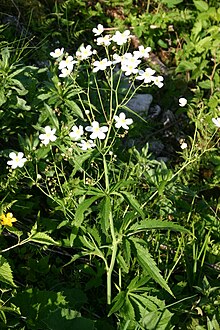| Ranunculus platanifolius | |
|---|---|

| |
|
Scientific classification
| |
| Kingdom: | Plantae |
| Clade: | Tracheophytes |
| Clade: | Angiosperms |
| Clade: | Eudicots |
| Order: | Ranunculales |
| Family: | Ranunculaceae |
| Genus: | Ranunculus |
| Species: | R. platanifolius
|
| Binomial name | |
| Ranunculus platanifolius L.
| |
Ranunculus platanifolius, the large white buttercup, is a species of perennial herb of the buttercup family ( Ranunculaceae) growing in mountains of Europe.
Description
The large white buttercup is an herbaceous plant 30 – 100 cm tall, with glabrous stem with many branches. [1]
The leaves are palmate, each divided into five segments with dentate margin. Flowers are organized into cymes; each flower has a calyx with five sepals, a corolla with five white petals, many stamens with yellow anthers and many styles. [1]
Fruits are hooked achenes. [1]
Distribution and habitat
This plant lives in mountain woods and forests of Europe, from 800 to 2000 m above sea level. [1]
Toxicity
As other Ranunculaceae, this plant is toxic because it contains anemonin. [1]
References
| Ranunculus platanifolius | |
|---|---|

| |
|
Scientific classification
| |
| Kingdom: | Plantae |
| Clade: | Tracheophytes |
| Clade: | Angiosperms |
| Clade: | Eudicots |
| Order: | Ranunculales |
| Family: | Ranunculaceae |
| Genus: | Ranunculus |
| Species: | R. platanifolius
|
| Binomial name | |
| Ranunculus platanifolius L.
| |
Ranunculus platanifolius, the large white buttercup, is a species of perennial herb of the buttercup family ( Ranunculaceae) growing in mountains of Europe.
Description
The large white buttercup is an herbaceous plant 30 – 100 cm tall, with glabrous stem with many branches. [1]
The leaves are palmate, each divided into five segments with dentate margin. Flowers are organized into cymes; each flower has a calyx with five sepals, a corolla with five white petals, many stamens with yellow anthers and many styles. [1]
Fruits are hooked achenes. [1]
Distribution and habitat
This plant lives in mountain woods and forests of Europe, from 800 to 2000 m above sea level. [1]
Toxicity
As other Ranunculaceae, this plant is toxic because it contains anemonin. [1]